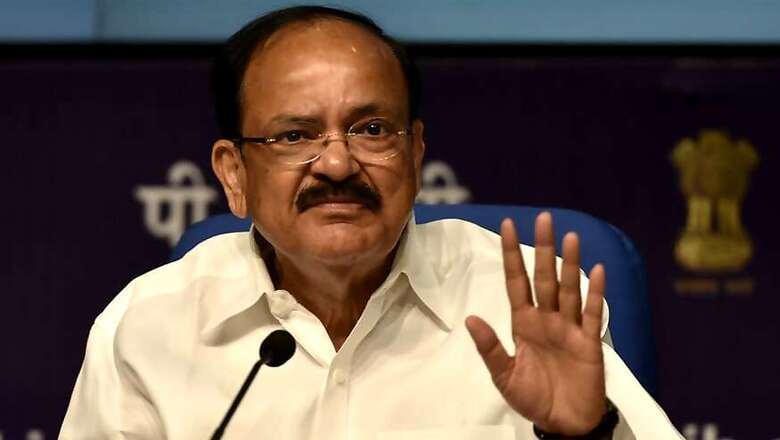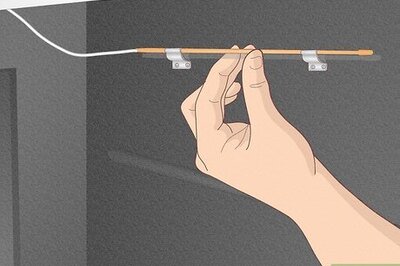
views
Chennai: Vice President M Venkaiah Naidu on Monday said Governors of states are not some "political parallel power centres", adding their duty was to be a "mentor and thought leader" to guide the government and the people.
"Today the Governors in India are constitutional representatives. They are not some political parallel power centres. In our democracy, he is a ceremonial head," he said.
In his address at Raj Bhavan here after presiding over a book release event and dedicating a solar power plant, the Vice President said a Governor cannot "interfere" in the regular functioning of a government.
"In our democracy he (Governor) is a ceremonial head. Only the ministry has true powers. You have to understand the Governor's powers and limitations."
"Without knowing the governor's powers and limitations if you come with your own expectations and then get disappointed, nobody can help you," Naidu said.
He was speaking at the event organised to release a book titled "Those Eventful Days" on Maharashtra Governor Ch Vidyasagar Rao's stint in Tamil Nadu while holding its additional charge since September 2016 till last month.
Naidu said Rao had discharged his responsibilities during his tenure to the 'maximum satisfaction of the Constitution.'
"Some people may be happy, some people may be unhappy, but you cannot make everybody happy as you have to act as per the Constitution," Naidu said.
During Rao's stint in Tamil Nadu, the state witnessed a spate of political twists and turns following hospitalisation of then Chief Minister J Jayalalithaa on September 22, 2016, and her subsequent death in December last.
A rebellion by now Deputy Chief Minister O Panneerselvam and a patch up in August with Chief Minister K Palaniswami and the former's induction in the cabinet were also witnessed.
Meanwhile, another split in the ruling AIADMK following a revolt by 19 party MLAs owing allegiance to sidelined leader TTV Dhinakaran against Palaniswami prompted opposition calls to the Governor for directing a floor test of the incumbent government.
These MLAs had met the Governor and sought removal of Palaniswami, saying they had lost confidence in him.
Opposition parties led by DMK and its leader M K Stalin had made a beeline to Rao, urging him to direct a floor test of the Palaniswami government, contending he had lost majority, even as Assembly Speaker P Dhanapal disqualified 18 rebel legislators.
One MLA had jumped to the Palaniswami faction. Both DMK and the disqualified MLAs had moved the court on
the issues of floor test and against the disqualification, respectively.
Without dwelling into the political developments in Tamil Nadu, Naidu however expressed his desire to see a stable government in the state.
The Vice President said he does not want to make any comment directly on the political happenings in Tamil Nadu.
"What is required in Tamil Nadu is a stable government. What is required is governance."
"What is required is to fulfil the promises made in the last elections when Amma Jayalalithaa was there. Whether you do your responsibility or not, the ultimate judgement has to be given not by the Governor, but by the people at the appropriate time," he said.
The Governor "cannot interfere" in the regular functioning of the government because the Constitution
mandates the Governor as a "guide and philosopher," he said.
"He is a catalyst, facilitator, mentor, motivator and also a thought leader to guide the Chief Minister, council of ministers and the people. That is the duty of the Governor," he said.
A Governor has to preserve, protect and defend the Constitution and law and devote themselves to the service and the well being of the people, which was their "duty", he said.
"To my knowledge, Rao has done that duty as per the Constitution," the Vice President added.
Naidu, who inaugurated a Rs 4.5 crore solar power plant to meet Raj Bhavan's power requirements, said the world was now moving towards this renewable energy.
With Prime Minister Narendra Modi taking an initiative in this regard, India was leading from the front on solar power, he said.
On the prime minister's policy of "reform, perform and transform," Naidu said a "big" transformation was taking place and urged the Central and state governments to join hands to take the country forward.
He said once elections are over, people should forget politics and focus on development and good governance. For that the central government and state government should work together, he added.
The leadership of the country should focus on important issues such as poverty eradication, empowering women, ending untouchability among others, he said and rued instances of members of certain sections still being denied entry into temples.




















Comments
0 comment